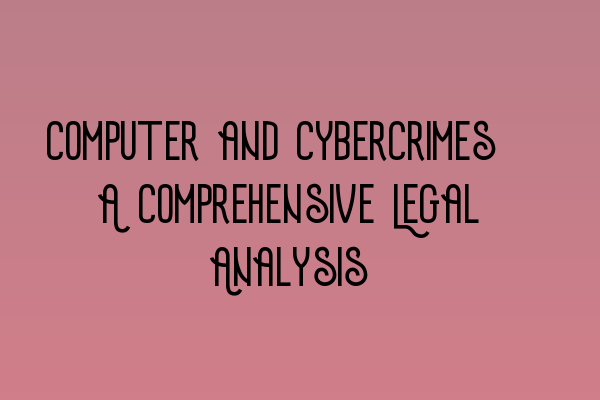Computer and Cybercrimes: A Comprehensive Legal Analysis
Welcome to the SQE Criminal Law & Practice Law UK blog! In this article, we will provide you with a comprehensive legal analysis of computer and cybercrimes. With the rapid advancement of technology, these crimes have become increasingly prominent and require a deep understanding of both the legal and technical aspects involved.
The Rise of Computer and Cybercrimes
As the world becomes more interconnected, criminals have found new ways to exploit technology for their malicious activities. This has led to the rise of computer and cybercrimes, which encompass a wide range of illegal activities such as hacking, identity theft, phishing, and data breaches. These crimes not only have severe financial implications but also pose a threat to national security.
In order to combat these rapidly evolving offenses, lawmakers have enacted specific legislation to address computer and cybercrimes. These laws aim to provide legal frameworks for investigation, prosecution, and punishment of offenders, while also safeguarding the rights of individuals.
Key Computer and Cybercrime Legislation
One of the key pieces of legislation in the UK is the Computer Misuse Act 1990, which criminalizes unauthorized access to computer systems, as well as the creation, dissemination, and use of malicious software. This Act has been crucial in prosecuting hackers and other cybercriminals.
Another important legislation relating to cybercrimes is the Data Protection Act 2018. This Act sets out the rules and regulations surrounding the processing and protection of personal data, ensuring that individuals have control over their own information and are protected against data breaches and misuse.
The Role of Law Enforcement and Investigation
Law enforcement agencies play a vital role in combating computer and cybercrimes. Specialized units, such as the National Cyber Crime Unit, are responsible for investigating and prosecuting offenders. These units employ highly skilled professionals who have expertise in digital forensics, allowing them to gather evidence and build strong cases against perpetrators.
It is important for individuals and businesses to report any suspected computer or cybercrimes to the relevant authorities promptly. Timely reporting can help facilitate investigations and increase the chances of apprehending and convicting offenders.
Protecting Against Computer and Cybercrimes
Prevention is always better than cure when it comes to computer and cybercrimes. It is essential for individuals and businesses to take proactive measures to protect themselves from these offenses. This includes implementing robust cybersecurity measures, such as strong passwords, firewalls, and regular software updates.
Seeking legal advice from professionals with expertise in technology and cybersecurity is also crucial. They can assess the vulnerabilities within your systems and provide guidance on compliance with relevant laws and regulations.
Conclusion
In conclusion, computer and cybercrimes pose significant challenges in today’s digital age. It is essential for individuals, businesses, and governments to work together to combat these offenses effectively. By staying informed about the relevant legislation and taking proactive measures to safeguard against cyber threats, we can mitigate the risks associated with computer and cybercrimes.
For more information on related legal topics, check out these articles:
- Legal Representation for Delaware LLCs in the UK: Expert Advice
- Ensuring Ethical Business Practices: Delaware’s Code of Conduct
- Legal Challenges for UK Businesses in the U.S.: Strategies for Overcoming Hurdles
- Legal Challenges for UK Businesses in the U.S.: Strategies for Overcoming Hurdles
- SQE Exam Prep: Essential Study Materials for Aspiring Solicitors
